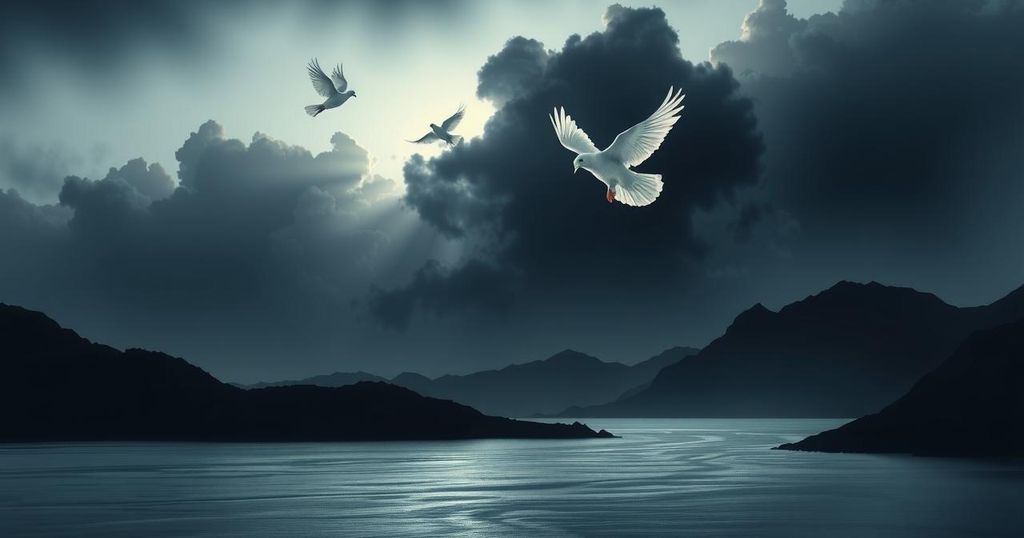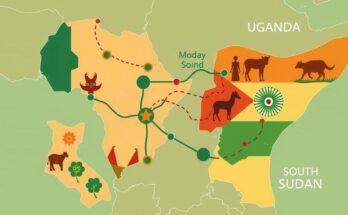Congo’s forces are battling Rwanda-backed M23 rebels in Goma, heightening a lengthy conflict linked to ethnic tensions. The rebel advance has led to increased violence and civilian casualties, with the United Nations emphasizing a critical humanitarian crisis. International condemnation grows against Rwanda, while domestic protests arise, pressing President Tshisekedi to respond effectively to the escalating situation.
Congo’s security forces are engaged in a violent confrontation with Rwanda-backed M23 rebels advancing towards Goma, escalating a long-standing conflict. On January 26, 2025, gunfire and explosions were reported in Goma, a city housing millions and a plethora of internally displaced persons due to ongoing ethnic strife. M23 rebels, who temporarily controlled Goma in 2012, have resurfaced amid renewed support from Rwanda, which the Rwandan government denies.
Residents expressed their fears amid the chaos, noting that the situation has drastically deteriorated. Sam Luwawa, a Goma resident, described the sounds of ongoing shelling and gunfire, indicating the uncertain control over the city by the rebels. Casualties reported include three South African peacekeepers who were killed by a mortar bomb, adding to the rising toll of 17 peacekeepers and soldiers in recent clashes.
The humanitarian crisis in Goma is critical, with many civilians forced to flee as violence escalates. According to Bruno Lemarquis, the United Nations humanitarian coordinator for Congo, there have been reports of extensive civilian injuries within hospitals struck by artillery fire. Essential supplies are running scarce as aid groups are obstructed from reaching displaced populations amid blocked roads and halted airport operations.
International condemnation of Rwanda’s backing of the rebels is mounting, with several nations expressing concern over the deterioration of security in the region. The U.S. Secretary of State, Marco Rubio, exchanged discussions with Congolese President Félix Tshisekedi, highlighting the urgency of resuming peace talks to ameliorate the escalating situation. Amidst these tensions, protests have erupted in Kinshasa, condemning Rwanda’s involvement.
Opposition leader Martin Fayulu criticized President Tshisekedi for his perceived inaction and called for further demonstrations against Rwanda’s influence. Fayulu warned of dire consequences should the President continue to ignore the severity of the conflict, suggesting he would be held accountable for any resulting decline in national stability. This mounting pressure may compel the government to address the unfolding crisis more decisively.
The Democratic Republic of the Congo has been embroiled in conflict for decades, primarily due to ethnic tensions and struggles for control over its rich mineral resources. The resurgence of the M23 rebel group, historically linked to Rwandan support, has intensified violence in the eastern regions, particularly around Goma, a critical trade and humanitarian center. The conflict has resulted in a massive humanitarian crisis, with millions displaced from their homes, emphasizing the dire need for effective diplomatic solutions to restore peace.
The situation in Goma remains precarious as Congo’s forces confront advancing rebels, exacerbating an already severe humanitarian crisis. Ongoing violence threatens civilian lives, and international condemnation of foreign support for the rebels increases. Political pressure mounts on the Congolese leadership to take decisive action, while the humanitarian needs of the displaced worsen, calling for urgent intervention and resolution efforts.
Original Source: apnews.com




